You’ll have read it somewhere. You might have a mug, notebook, cushion or tote bag with the word emblazoned across the front. Perhaps you’ve listened to a podcast about it. You may have even used it yourself, as I did last year in my book about female friendship: “It’s unenviable to be the friend who chooses to step back and do some adulting,” I wrote, breezily throwing out the term without a second thought.
And yet, it’s been only a decade since the word “adulting” entered our consciousness, placed there by Kelly Williams Brown who wrote a bestselling book about it in 2013 called Adulting: How to Become a Grown-Up in 468 Easy(ish) Steps. It described the ability to carry out the activities and responsibilities expected of any grown-up, from work to dating, but which didn’t come easily to a millennial generation ticking off its milestones later than the ones before and struggling to marry that extended freedom with doing tax returns or having enough loo roll in the house. It was about being mature, when it’s much easier not to be.
This was the millennial version of wanting to have it all: enjoying an extended period of carefree youth, while also having our shit together. Or giving the appearance of it, at least. Coming home from a house party at 5am and still changing the bedsheets the next morning (okay, evening). The reassurance that, yes, it is fine to eat toast for every meal, as long as you fold your clothes. Adulting seemed to present the solution – and we lapped it up. At one point it was even mooted to become a TV comedy by JJ Abrams, and was added to the Oxford English Dictionary in 2020: “The action or process of becoming, being, or behaving as an adult; the carrying out of the mundane or everyday tasks that are a necessary part of adult life.”
So, 10 years on, with its readers now undeniably grown-up, what have we really learnt about adulting?
When the book came out, I was swimming against the tide of my late twenties – living in a friend’s spare (box) room after breaking up with my boyfriend, with most of my belongings stashed at my parents’ house, going out non-stop and ignoring words like “pension” and “ISA”. Brown’s advice was just the sort of thing that I, and others like me, wanted to hear – even if much of it was, frankly, what Mum and Dad had been telling us all along. There was the reassuring stuff: “A big part of being a well-adjusted person is accepting that you can’t be good at everything.” The crucial stuff: “No one, ever, will set boundaries for you. So learn to set them yourself.” The tough love: “Most of the world doesn’t give a flying fuck about you.” And the foreshadowing of our Marie Kondo obsession: “Do not keep things in your house that make you feel sad or bad.”
There were also things aimed specifically at my generation in 2013, such as “If you wouldn’t show or tell your mum, boss and ex-boyfriend, then don’t put it on Facebook,” and “Do not treat your friends like your unpaid life coaches.”
It was a combination of unapologetically being yourself – the “authenticity” that’s such a buzzword now, especially if you’re Prince Harry - and faking it ’til you make it. Basically, what a generation that had been thirsty for relatable role models wanted to hear. This was the moment when being a millennial became cultural catnip. Lena Dunham’s Girls had recently launched and, like Brown’s book, was for millennials by a millennial and showed a group of millennials taking their first confusing steps into adulthood and working out who they were in the world (albeit an overwhelmingly white world). It was also the year of Frances Ha, starring Greta Gerwig as a 20-something mess, trying to navigate her professional dreams and crumbling friendships, and edge a little closer to adulthood while doing it. Also, we’d just found out that Dan Humphries was Gossip Girl.
Through it all, the message about adulting remained the same: the goal was to get onto that traditional life path. The one you’re supposed to follow. Meet a partner, buy a home, start a family. All while nailing it at work, being an amazing friend and having the perfect wardrobe.
No wonder many of us felt as though we needed a rule book.
Now? Some of Brown’s advice did stick – I do always buy loo paper in bulk. Although I ultimately rejected her rule for avoiding office romances – “Live your life as though everyone in the office has plastic, featureless doll crotches” – as I met my husband when he sat at the desk opposite mine.
Paying bills on time and writing thank you letters, funnily enough, didn’t turn out to be the blueprint for growing up that we’d hoped it might be (although I still do both). There wasn’t much room for making mistakes in this version of adulting – which is, of course, the only way to become truly adult. Plus, in highlighting our extended adolescence, did it compound the millennial stereotype of a generation of fragile, self-obsessed snowflakes who can’t get a mortgage because we eat too much brunch?
Brown herself has all but rejected the term “adulting” in the last decade (“it haunts me”) and admits that having written an advice book for millennials made her feel like a failure when she inevitably messed things up herself and didn’t have it all together. Which, I suppose, is how we arrived at the other millennial trend: being a hot mess à la Fleabag.
The book was republished in 2017 and still sells well now. But much of its advice – such as how to decorate your first flat stylishly – must ring hollow for Gen Z, whose lives were so drastically put on hold by Covid, and who are hampered by even crueller economic and social (media) pressures. Their concerns are not the same as ours were only a decade ago, while we millennials are now consumed by worries about childcare costs, caring responsibilities, rising bills, ageing parents and impending midlife. Under that definition, who’d want to do any adulting at all?
Claire Cohen is the author of BFF? The Truth About Female Friendship


.jpg)